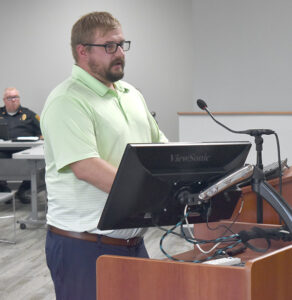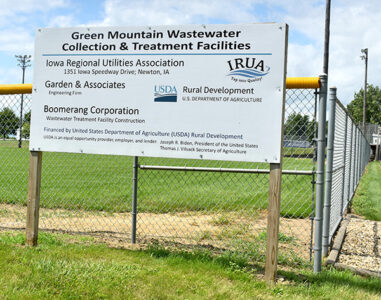Water Works GM, mayor address Legionnaires’ outbreak during city council

T-R PHOTO BY ROBERT MAHARRY — Marshalltown Water Works General Manager Zach Maxfield addresses the city council about the Legionnaires’ Disease outbreak during Monday night’s meeting. So far, there are no indications that the 30 reported cases in Marshall County are connected to the city’s drinking water supply.
While it wasn’t included as a specific action or discussion item on Monday night’s city council agenda, an issue of high priority and concern among Marshalltown residents was quickly brought up during the public comment period at the beginning of the meeting.
Not long after Jim Shaw asked the council for an update on the Legionnaires’ disease outbreak, which, as of 3 p.m. Monday, has affected 30 people in Marshall County and resulted in one death. As he stepped up to the podium, Marshalltown Water Works General Manager Zach Maxfield echoed previous comments he shared in a statement to the T-R and reiterated that the city’s drinking water is safe for consumption.
“I don’t have an update. We’re kept out of the loop kind of like everybody else, but I just wanted to come here and assure you guys in the community that Marshalltown Water Works’s water is safe to drink. All of our testing indicates that we’re meeting and exceeding industry and state standards,” Maxfield said. “I’m happy to, you know, field any questions on what we do and how we handle things, but I’m not gonna talk to you much about the disease itself.”
Mayor Joel Greer said Maxfield was the first person he called when he was contacted by a television news station, and Greer also indicated that he had spoken with state senators who are investigating the responses of the Iowa Department of Natural Resources (IDNR) and Iowa Health and Human Services (HHS) to situations like the outbreak.
According to Greer, Marshall County Public Health Director Sydney Grewell assured him that the drinking water is fine.
“It makes sense that if it comes from a bacteria, it’s probably not coming from your tap that has cold water running through it typically and not bubbling up and effervescing and doing the sort of thing that will carry this bacteria to other people,” Greer said.
Grewell also shared the link to a page on the Iowa HHS website, https://hhs.iowa.gov/health-prevention/disease-information, which will be updated daily by 3 p.m. until there are no cases for a consecutive 28-day period. The source of the outbreak has not yet been publicly reported, though HHS, in a previous release, said it originated in north central Marshalltown.
“We, as the city, don’t know anything more than what we can get from those two departments, but for those of you that fear drinking water in Marshalltown, it not only tastes the best, but it’s tested, you know, 30 different ways. We haven’t had a bad test in over a year, and it keeps winning the contest on the most palatable water to drink here, so don’t worry about that,” Greer said. “We do, certainly, as a city, express real regret and sorrow for the family affected by the one victim who has died. Father Grady was well-liked and a good man, and there are 29 other people that have had the diagnosis.”
The mayor added that Grewell told him any health provider in Marshalltown can test individuals with symptoms for Legionnaires’, and he noted that COVID-19 has also made a comeback in recent weeks.
“For the public out there watching and those of you who showed up tonight, that’s the best that we know, and that website is the best place to check on a daily basis,” Greer said.
Number of cases up to 30, state says
According to information provided by Iowa HHS, the number of Legionnaires’ disease cases in Marshall County has increased to 30 as of Monday.
When the outbreak was initially announced last Thursday, the number provided was 21. So far, one individual, Bernard Grady of Marshalltown, has died after contracting the disease. Legionnaires’ disease is caused by breathing in bacteria from sources of contaminated water. It is not spread person-to-person. This bacterium has been found in many different kinds of water systems, such as hot and cold-water taps and showers, creeks, ponds, whirlpool spas, cooling towers and evaporative condensers of large air-conditioning systems. Outbreaks have also been linked to decorative fountains, humidifiers, respiratory therapy devices and grocery store vegetable misters. These bacteria are more likely to reproduce in high numbers in warm, stagnant water and can be difficult to remove from a water supply.
Legionnaires’ disease presents with anorexia, malaise, muscle aches, headache and fever. Abdominal pain and diarrhea are also common. It will take between two to 10 days after being infected with this bacterium to show symptoms of Legionnaires’ Disease.
Legionnaires’ disease is a serious illness and requires treatment. Symptoms progress to include fever up to 105° F, chills, non-productive cough, stomach pain and diarrhea.
Legionnaire’s Disease often turns into pneumonia, and some people can die from it if not treated carefully.
——
Contact Robert Maharry at 641-753-6611 ext. 255 or
rmaharry@timesrepublican.com.





